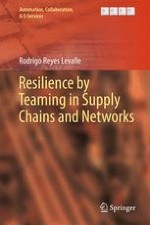2018 | OriginalPaper | Buchkapitel
10. Case Study A: Internal Flow Control Protocol Applied to Unreliable Production Lines
verfasst von : Rodrigo Reyes Levalle
Erschienen in: Resilience by Teaming in Supply Chains and Networks
Aktivieren Sie unsere intelligente Suche, um passende Fachinhalte oder Patente zu finden.
Wählen Sie Textabschnitte aus um mit Künstlicher Intelligenz passenden Patente zu finden. powered by
Markieren Sie Textabschnitte, um KI-gestützt weitere passende Inhalte zu finden. powered by
